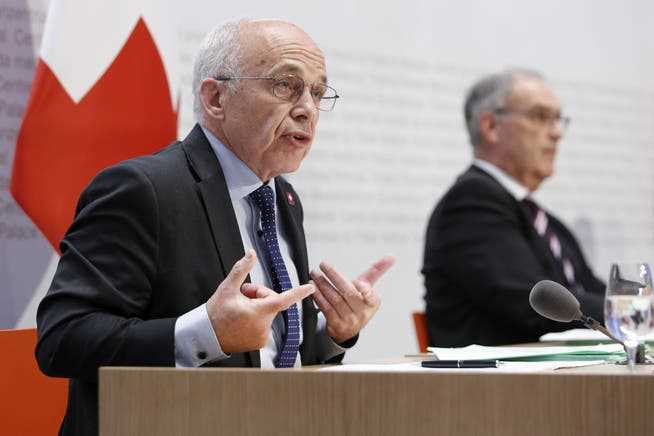The federal government has done the emergency aid for the economy in the pandemic with the big trowel. The risk of abuse was accepted. The most recent data suggest that there are at least a few thousand cases. In addition, the special aid was permissible for a few thousand companies, but unnecessary.
The pandemic has hit many companies hard.
The Swiss economy has received corona aid for around 40 billion francs via federal programs since March 2020. A good half of this is non-repayable. The central instruments were short-time work benefits, hardship aid for companies, earnings replacement payments and Covid loans. “Speed before accuracy” was the motto of politics. The risk of unnecessary help and abuse was accepted. But how big was the extent of abuse? The reports of the Swiss Federal Audit Office (SFAO) published on Monday and the latest federal information provide statistical information:
1. Covid loans
Almost 138,000 companies received Covid loans guaranteed by the federal government for a total of almost 17 billion francs. Loans for around 5 billion francs have already been repaid in full. According to federal information, there have been over 11,000 suspected cases so far. Some of the keywords mentioned: use of credit for dividends and other improper purposes, incorrect sales information, multiple applications and applications from bankrupt companies. So far, around 7,300 suspected cases have been clarified. A good half of these led to corrections without criminal charges. Criminal charges were filed in almost 1,500 cases involving a total of around 220 million Swiss francs. The following magnitudes can currently be estimated: The reviews lead to corrections in around 4 percent of all Covid loans and to criminal charges in around 2 percent.

Finance Minister Ueli Maurer announcing the Covid loan program in March 2020.
2. Hardship assistance
By December 2021, almost 37,000 companies had received hardship aid totaling almost CHF 4.9 billion as part of the federal program. Eligible were companies that were forced to close, as well as other businesses with sales losses of at least 40 percent. According to the SFAO, by the end of November 2021, over 8,000 applicants who were not forced to close reported a drop in sales of over 40 percent – but for a third of these companies the analysis results contradict this information. The SFAO based its analysis on a comparison with the sales figures for VAT.
The State Secretariat for Economic Affairs (Seco) puts it into perspective: Such a discrepancy is not in itself a concrete suspicion – because in a large part of these cases there are legitimate explanations. The SFAO also concedes that there are such declarations. In certain cases, the comparative sales mentioned on the auxiliary requests only related to individual company divisions, while the VAT statement covers the entire company. Another example: In the case of young companies, the VAT return for 2018 or 2019 may not contain any sales information for an entire year.
According to Seco, the cantons should look at the discrepancies identified by the SFAO – but where there is a simple explanation, there is no suspicion. In total, the cantons had located around 1,800 questionable cases by the end of March 2022, most of which are still being clarified. Of the almost 340 clarified dossiers, around a tenth of the cases were corrected without criminal charges or criminal charges were filed. The information provided so far suggests that the rate of recorded errors and abuses in cases of hardship is not much more than 1 percent.
The temporarily closed businesses did not always have a massive drop in sales over an entire financial year, as the financial control emphasizes: According to information for VAT, the drop in sales in 2020 was less than 40 percent for more than 13,000 forced closures; In 2,400 cases, sales in 2020 even exceeded the comparative value of 2018/19. This means that some companies were then able to partially compensate or even overcompensate for the losses caused by the forced closure. According to the SFAO, hardship aid for such companies was permissible, “but in retrospect they would not have been necessary in these cases”.
3. Short-time work benefits
According to the SFAO, almost 163,000 companies received short-time work benefits totaling almost CHF 14 billion from March 2020 to the end of 2021. The possibility of simplified billing procedures saved companies and authorities administrative work, but also increased the potential for abuse. By March 2022, Seco had received almost 1,200 tips on suspected cases of abuse. In two-thirds of these cases, the preliminary examination confirmed the suspicion. And in 70 percent of the cases that have been examined so far, there have been claims for reimbursement. In 33 cases, the authorities even located abuse, which led to a criminal complaint.
More is likely to come. And after the abuse reports have been processed, additional “risk-oriented” checks should begin. According to the federal government, unlawful short-time work payments can be reclaimed up to five years after they have been paid out.
Inevitable price
Any abuse is one case too many. But attempts at abuse are an inevitable side effect of state aid payments – especially if the payments are to flow as quickly and widely as they did after the outbreak of the corona pandemic. Among the previous cases in need of correction, there were blatant abuses, honest mistakes and some cases between these poles. According to current knowledge, the rate of recorded abuses may be in the range of less than 1 percent to about 2 percent. That seems manageable. But then there would be the number of unreported cases – and this naturally remains in the dark.
